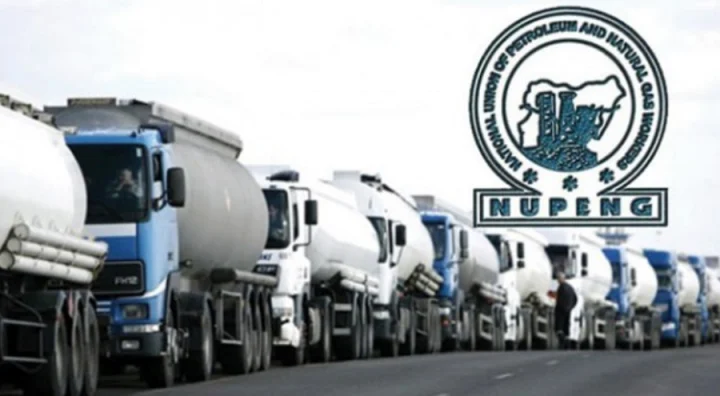The Nigeria Union of Petroleum and Natural Gas Workers (NUPENG) has accused Dangote Refinery of breaching the terms of a recently signed Memorandum of Understanding (MoU), placing its members on “red alert” for the resumption of a nationwide strike. The unfolding dispute centers on how tanker drivers—specifically members of the Petroleum Tanker Drivers (PTD) branch—are treated under the agreement, threatening to undermine a fragile peace that had briefly settled tensions at the refinery.
The MoU, signed on September 9, involved NUPENG, Dangote Group, the Ministry of Labour, representatives from the Nigerian Midstream and Downstream Petroleum Regulatory Authority (NMDPRA), as well as labour federations. Its purpose was to resolve earlier grievances and ensure that employees willing to join recognised unions would be allowed to do so without intimidation or victimisation. Key components of the agreement were that the unionisation process should begin immediately and conclude within a two-week deadline (September 9-22), and that no worker should be penalised for union affiliation.

Shortly after the signing, NUPENG said it observed actions by Dangote’s management that appear to violate these guarantees. According to a statement by NUPENG’s national leadership, Alhaji Sayyu Aliu Dantata, who represented Dangote in the MoU, ordered truck drivers who are long-standing NUPENG-PTD members to remove union stickers from their vehicles. The action was said to have occurred the day after the MoU was inked. Further, the union claims that these drivers were instructed to proceed to the refinery to load fuel, but when union officials tried to enforce loading rules, security personnel—including the Navy—were reportedly called in to suppress the union’s actions.
NUPENG President Williams Akporeha and General Secretary Afolabi Olowale have declared that, in light of these alleged breaches, their members are on high alert and may resume suspended industrial action if the issues are not addressed. The union has appealed to civil society groups, labour federations including the Nigeria Labour Congress (NLC) and the Trade Union Congress (TUC), and government agencies to uphold the MoU’s terms and ensure that Dangote respects its obligations.
Dangote Refinery, however, has refuted NUPENG’s allegations. The company maintains that union membership remains voluntary, that no driver has been compelled to remove union identifiers, and that it is acting within the law. A spokesperson for the refinery defended the company’s use of compressed natural gas (CNG) powered trucks as part of its logistics expansion and energy transition strategy, while asserting that this is not aimed at undermining current transporters or their union rights.
Analysts say this dispute is high stakes. The refinery has become central to Nigeria’s energy landscape, with its capacity and promise of stabilised fuel supply. A breakdown in relations with tanker drivers could threaten operations, disrupt fuel distributions, and reignite fears of scarcity. Given the proximity of this standoff to a planned free or reduced-price fuel distribution effort by Dangote, the timing of this conflict raises questions about how well the refinery can manage both its logistical commitments and its labour relations.
Employment conditions, safety, and welfare have long been sore points for tanker drivers in Nigeria. PTD members have previously raised concerns over unequal pay, lack of safety infrastructure, and harsh working conditions—issues that were partially addressed in discussions leading to the MoU. The new allegations suggest that, despite formal agreements, there may still be friction in how the agreements are operationalised.
Government actors, having facilitated the MoU and mediated between the parties, are now under pressure to ensure enforcement. Observers from labour and regulatory circles argue that Dangote’s alleged actions, if not checked, could set a negative precedent for industrial relations in Nigeria’s oil and gas sector. They say that both legal and ethical considerations are at stake, particularly given that the agreement was signed in the presence of senior government officials.
The possibility of strike resumption has sparked concern among fuel marketers, consumer groups, and transport associations. These stakeholders warn that any disruption in tanker operations could quickly translate into fuel shortages at retail outlets, increased transport fares, and inflationary pressure on everyday commodities. Some have called for urgent intervention by the Ministry of Labour and regulatory agencies to ensure that Dangote adheres strictly to the MoU and that accountability measures are enforced.
Public reactions have been mixed. On one hand, many Nigerians sympathise with the drivers, seeing the removal of union symbols as symbolic of deeper labour rights issues. On the other hand, some are wary of another fuel disruption, especially given recent efforts to stabilise prices and improve supply. There is growing sentiment that while Dangote has contributed positively to reducing fuel import dependency, it must also maintain equitable relations with its workforce to sustain trust.
As of now, key questions remain unanswered: Will Dangote reverse the alleged directives ordering the removal of union identifiers? Will the refinery take disciplinary action against those who purportedly violated union members’ rights? And will the federal government or regulatory bodies take steps to enforce the agreement?
The next few days could determine whether this confrontation escalates or whether a renewed spirit of compliance and dialogue prevails. With the deadline for completing the MoU still active, labour watchers are watching closely. In the larger picture, this episode underscores how union rights, corporate governance, and industrial peace remain deeply intertwined in Nigeria’s search for stable energy supply, fair labour practices, and vibrant economic growth.
Support InfoStride News' Credible Journalism: Only credible journalism can guarantee a fair, accountable and transparent society, including democracy and government. It involves a lot of efforts and money. We need your support. Click here to Donate
